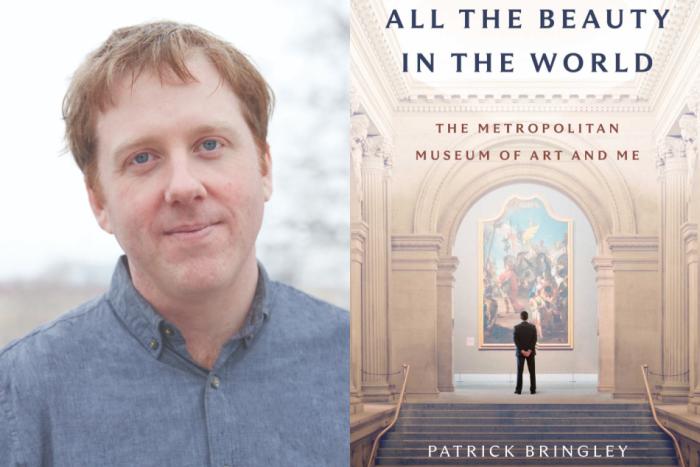Haley Cullingham: So, this summer, Hazlitt turned ten years old. Which, given I remember our then-publisher saying when he hired me seven years ago that he couldn’t even guarantee us a year, is extremely exciting.
Jordan Ginsberg: I…don’t think I ever got that note? Feels like somebody just walked over my grave. But, yes, in the dog years we use to measure digital publishing, Hazlitt is several thousand years old now, and what better time to mix things up, in my opinion. Famously, people love change.
HC: Thank you for the vote of confidence. So, then, before we talk about all the big changes that are coming this year, can you give us a little overview of your seven years as the editor-in-chief of Hazlitt? What stands out to you as most memorable about the site’s decade of life?
JG: It really has to start with the writers and artists we’ve worked with along the way, doesn’t it? That is a very obvious answer, but given that we’ve never had much of a mandate beyond making a site that we wanted to read and just kind of encouraging contributors to run wild and pursue their passion projects in order to achieve that, the extraordinary amount of incredible work we’ve published is, among other things, a real testament to everyone’s ability to navigate an editorial sensibility that has been, let’s say, pleasantly mercurial. (I hope.)
HC: I know this could be an extremely long list, but could you share a few pieces you edited that have really stuck with you over the years?
JG: Wow, Feds Cullingham wants names named. Going back, though, Sarah Weinman’s “The Real Lolita” was a huge turning point—by far our biggest and most involved project up to that point, and a kind of perfect synthesis of the journalistic and literary ambitions we had for the site at its best, and I think helped set the tone more broadly for a kind of crime writing that was more interested in helping to reclaim and elevate the voices of victims.
And despite being published by the world’s largest trade publisher, being literature- or book-adjacent was never mandatory by any means, though it did come up organically fairly frequently. Nick Hune-Brown on Gordon Korman, for example, or Rafe Bartholomew on his iconic bartender father’s long-simmering life as a poet (adapted from his wonderful book, Two and Two). That being said, we did build up a robust fiction section, featuring the likes of Bryan Washington and Michel Faber and Zoe Whittall and Olga Tokarczuk. And there have been many great pieces about the broader worlds of art and culture and technology and beyond, and the experiences that become meaningful to us, and how we in turn imprint that meaning on the world around us—Samuel Ashworth on Dirty Dancing as the great Jewish horror movie, say, or, Helena Fitzgerald on the end of AOL Messenger (and, elsewhere, on the colour green, in general), or Nick Hune-Brown on the Shen Yun ballet, or Elisa Albert on (and against) ambition, or Soraya Palmer on decolonizing desire. And, while you and I are in fact the products of journalism school, we never intended for Hazlitt to be a news site (except for those few years when the great John Michael McGrath was Canada’s best news blogger), but Alicia Elliott’s essay after the killing of Colten Boushie and Anthony Oliveira on Toronto’s gay village in the aftermath of the arrest of a serial killer who had been terrorizing it for years were stunning, foundational pieces of writing.
And that’s to say nothing of the whole enterprise that is the annual Year in Review series, which is just an absolute murderer’s row every single year. You know what’s fun is emailing your favourite writers on the planet and asking them to write about literally whatever they want. (And, occasionally, smuggling in your own stories about dog poop.)
In conclusion, Hazlitt, what a good website—a website that has, in fact, employed a number of extremely talented and wonderful people, from our founders, Robert Wheaton and Chris Frey and Alex Molotkow and Britt Harvey, to Scaachi Koul, to Anshuman Iddamsetty, to Kiara Kent, to our many excellent interns, to Haley Cullingham herself. Haley! You have also been part of the great Hazlitt internet machine for many years, and the site has increasingly reflected your taste and sensibility and vision, to its absolute and unambiguous benefit and success. What’s stood out to you?
HC: It’s extremely hard to choose. I think one of the best things about working at Hazlitt is that moment when a writer sends you a pitch that is so weird and delicious you just want to yell when you get it. So much of what has made the site great over the years is that we’ve tried to be a place where writers can write the pieces they’ve always wanted to publish, but hadn’t found the right home for. I’m thinking of those moments when, like, Matthew Braga emails and says “I want to write about what composers think the ocean sounds like,” or Will di Novi says he’s been watching an entire world happen in the alleyway behind his house for years, or Tom Thor Buchanan says he went to a town in Mexico full of dentists, or Suzannah Showler is like “so my parents sort of met in a cult,” or Alex Manley wants to write about growing up in a city full of lead pipes and it becomes this amazing anti-capitalist screed. Or his fellow Montrealer Heather O’Neill wants to write about perverts. Or Naomi Skwarna wants to write about swimming pools. Or Mayukh Sen wants to write about falling asleep listening to reruns of The Nanny. And those pieces are always so unexpected, and human, and wonderful. But there’s also the more traditional work, the reported pieces and cultural commentary, that have been so powerful as well. Some of the many pieces that stick out to me over the years are Neil Price’s essay on searching for humour in Black literature, Rollie Pemberton’s feature on Little Jamaica in Toronto, Jonathan Kaufmann writing about a legendary food column for those diagnosed with AIDS, Billy-Ray Belcourt on the linguistic terrain of Indigenous writing, Kathleen Hale on the Slenderman stabbings, Haley Mlotek on the perception of self-loathing in women’s writing, Alison Motluk on surrogacy, Anna Fitzpatrick on the Addams Family, and Tina Horn on Kink.com. But I could honestly keep going forever. We have been so, so lucky to work with the writers we have.
And something I do want to mention, which was a huge part of the reason I myself wanted to work at the site, was the respect and kindness I saw demonstrated by your editing before I got there. I was the editor-in-chief of Maisonneuve in Montreal at the time, and had so much admiration for everything you all were doing, and I remember thinking when you and I started corresponding: this is a person I want to work with and learn from. And then you hired me, so thanks for that.
So, we hit ten years, and of course that was an opportunity for a lot of reflecting and a lot of planning. One thing that is unique about Hazlitt is that, as you mentioned, we are owned by a publishing house, and you and I both edit books as well. And many of our favourite Hazlitt authors have since published books with us or with other wonderful editors at the company, which is amazing. But, at the risk of me feeling the power of your eye roll all the way from Nova Scotia where you are currently located, can you tell me a little about your own career arc, how you grew from a noted body modification columnist living in the Mexican desert to an acclaimed book editor, and what the future is going to look like for you?
JG: Finally, the chance to be the centre of attention—thank you for this. But, yes, in late 2004 I was a year and change out of high school, doing shipping and receiving in a snowboard and skateboard shop warehouse and not going to university, due to a lack of money and direction, generally, until the site BME, the body modification e-zine (e-zine, holy shit, 2004), announced they were going to hire a staff writer, and I, at the time a person of tattoos and piercings and whatnot, applied and got the gig, just a few months after they’d moved their operation from Toronto to La Paz, Mexico, where they then moved me, my first time ever on a plane. So with no real experience doing anything, I spent most of 2005 bopping around (Mexico City, Guadalajara, Las Vegas, Caracas) covering events and interviewing folks about the extraordinary things they were doing to their bodies and the bodies of others. I did end up going to the school formerly known as Ryerson University for a journalism degree after that, and from there ended up at the National Post, first in the sports section, then as the home page editor, and occasionally tricked them into letting me review heavy metal festivals and Tool concerts and whatnot. Then, in late 2012, an upstart internet periodical named Hazlitt announced it would be hiring an editor, and now here we are, one decade later. I’ve aged terribly. But, as you say, along the way, we were delighted that a number of our wonderful contributors were in fact going on to write books, and that helped spark the idea that became Strange Light, which launched in 2019, and which I am now going to be dedicating, well, all of my time to. Which means Hazlitt needs a new editor-in-chief. And that new editor-in-chief’s name…is Haley Cullingham.
Haley! As I said above, your voice and vision and skill and talent have increasingly been driving the site for years now, pushing it into new and thrilling and unexpected places, and knowing a little bit about what you’ve got planned, I cannot imagine better hands for Hazlitt to be in for its next phase and beyond. One of my core beliefs is that any time you have the opportunity to replace yourself with the country’s best magazine editor, you take it. The future is very bright. People are gonna plotz. What can you tell readers about what’s next? And also, how did you, the editor-in-chief of Hazlitt, get here?
HC: Ugh, thank you. In the years I’ve been here, the site has seen a lot of change. But the thing we’ve tried to keep consistent throughout is something it’s really important to me to carry forward when you abandon us: that we are a writer- and artist-first site. What that looks like has been a learning curve as the expectation and understanding of online publishing has shifted dramatically, but for us, it means paying fairly, supporting writers to develop their own voice, and publishing work that a writer feels is truly representative of their intention.
What I’m most excited about for this new iteration is that, for the first time in a long time, Hazlitt Island will not just be you and me doing our best not to turn into the characters from The Lighthouse. As part of the new vision, we’re hiring four incredible freelancers to help support the work the site does, and I’m obsessed with all of them. Each of the new contributing editors has a history with the site, and I’m so thrilled that they’ll become even more a part of making Hazlitt happen.
We’re bringing on two new features editors: Amelia Schonbek and Asna Shaikh. Amelia is based in New York, and has written for the New York Times, New York Magazine, Longreads, and more. She’s also the author of one of our most-read Hazlitt pieces of all time, a feature about Swan Lake’s place in Soviet politics. Asna is based in Vancouver and in addition to her experience at Room magazine and the Association of Book Publishers of British Columbia, she was our inaugural Hazlitt Fellow, and we’ve been benefiting from her incredible editorial eye ever since.
Hazlitt’s interviews section has always been something that we’re proud of, and I’m thrilled that we’re bringing on Naomi Skwarna as our interviews editor. Based in Toronto, Naomi has herself been part some of the site’s most memorable conversations, with authors such as Max Porter, Rachel Yoder, Ben Lerner, and George Saunders. She’s an award-winning writer, with beautiful work in places including the New York Times, SSENSE, The Believer, the Globe and Mail, and more. I’m so excited to see her apply her curatorial eye to the interviews section on the site.
And finally, we’re going to revive Hazlitt’s poetry section, which will be edited by the remarkable Billy-Ray Belcourt. From the Driftpile Cree Nation, Billy-Ray is a beloved author and academic (his most recent book, A Minor Chorus, was longlisted for the prestigious Giller Prize). I can’t wait to see what Billy-Ray will do with our poetry section.
I also want to highlight our columnists. We have Abhrajyoti Chakraborty writing about film, Natasha MH writing about fashion, Rollie Pemberton writing about music, with more to come. And of course, we’ll continue to publish the short features, longform, and fiction that have always been a crucial part of the site’s DNA.
A few other things that will change: moving forward, the site will publish on Wednesdays, and we’ll open submissions for short periods of time throughout the year—we’ll share more on that on our socials soon. But otherwise, we’ll be the Haz people know and love, which is to say, slightly chaotic, hopefully unpredictable in a delightful way, and committed to staying weird.
JG: Haley, I am just out here, looking out over the Northumberland Strait, watching bald eagles dive-bomb the hell out of unsuspecting waterfowl, the circle of life in action, pumping my fist. This rules. Hazlitt forever.
HC: Hazlitt forever!







